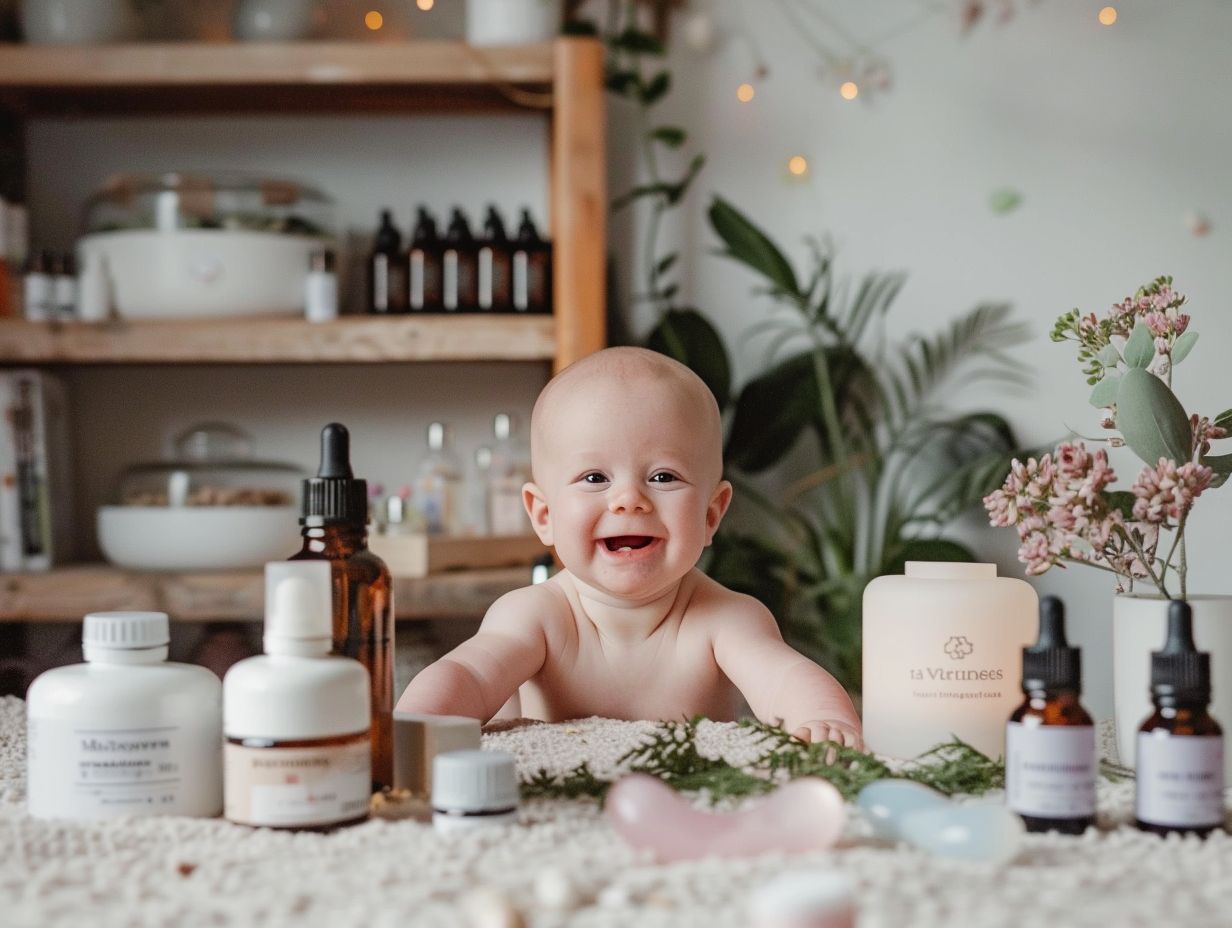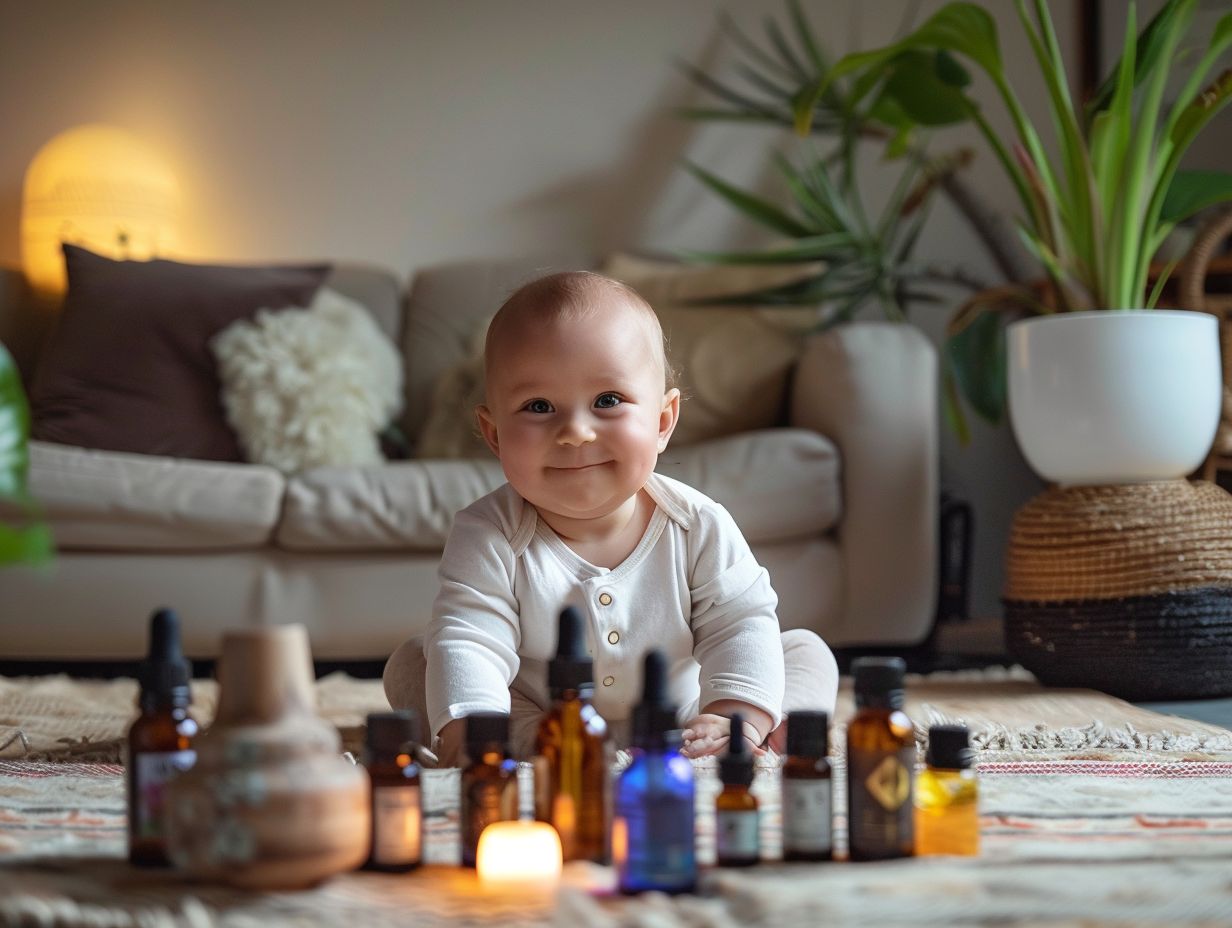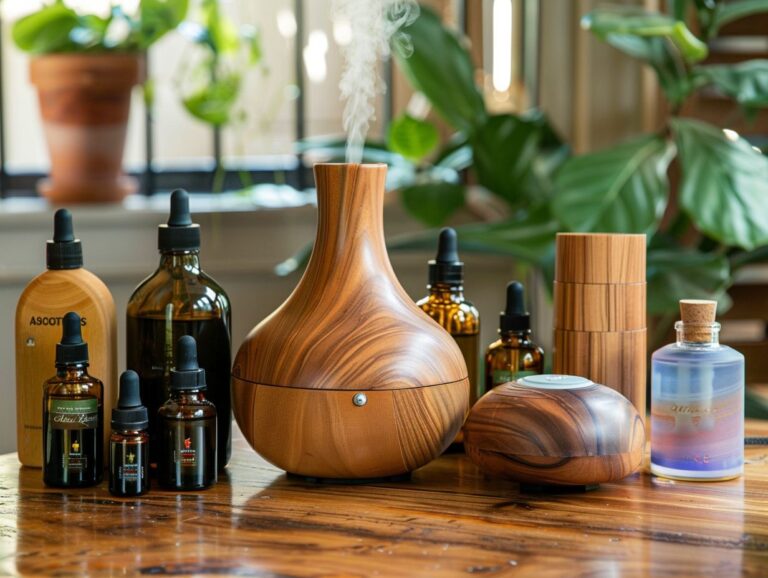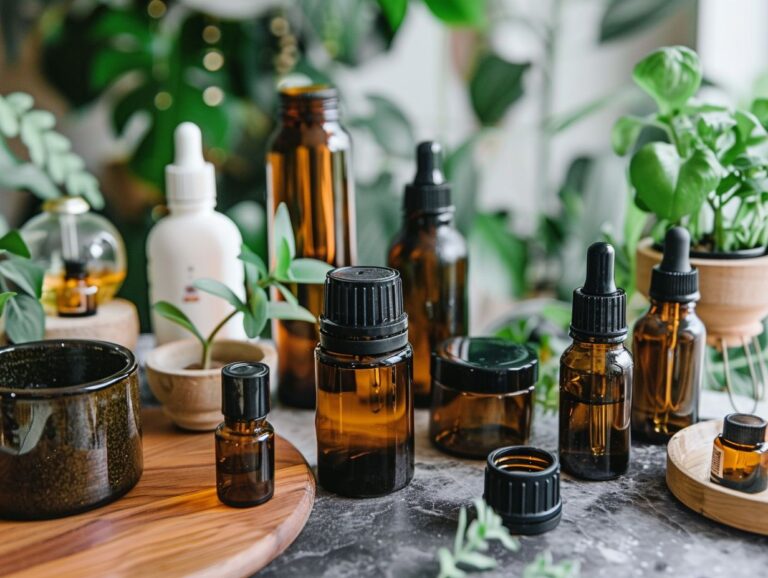Are Essential Oils Safe for Babies
Essential oils have gained popularity for their various health benefits, but are they safe for babies?
In this article, we will explore what essential oils are, how they are extracted, and their potential benefits for infants, such as promoting better sleep and boosting the immune system.
We will also discuss the risks associated with using essential oils on babies, including skin irritation and respiratory issues.
Learn how to safely use essential oils for your little one and discover which oils are considered safe for skin.
Key Takeaways:
What Are Essential Oils?
Essential oils are concentrated plant extracts that capture the natural scent and flavor of the plant. These oils are commonly used in aromatherapy, skincare products, and as natural remedies for various health issues.
Extracting essential oils involves several methods, with steam distillation being the most common. In this process, plant material is heated, and the steam carries the volatile compounds, which are then condensed back into liquid form, yielding highly potent essential oils. Lavender, peppermint, and tea tree oil are popular choices known for their calming, invigorating, and antibacterial properties respectively.
These essential oils can be found in a variety of products ranging from candles and perfumes to lotions and shampoos, offering a natural alternative to synthetic fragrances. Their therapeutic benefits extend to reducing stress, improving sleep quality, and supporting overall well-being.
How Are Essential Oils Extracted?
Essential oils are extracted through various methods such as steam distillation, cold pressing, or solvent extraction. For example, Lavender essential oil is often extracted through steam distillation, while Eucalyptus oil is commonly obtained through cold pressing.
Steam distillation is a popular method that involves passing steam through plant material to release the aromatic compounds. The steam carries the essential oil to a condensation chamber where it is separated from water. Cold pressing, on the other hand, is mainly used for citrus fruits like lemon and orange. It involves mechanically pressing the rinds to extract the oils. Solvent extraction uses chemicals to pull out essential oils and is often used for delicate flowers like jasmine and rose.
Some other popular essential oils and their extraction methods include Peppermint oil extracted through steam distillation, Tea Tree oil through distillation, and Patchouli oil using the solvent extraction method.
What Are the Benefits of Essential Oils for Babies?
Essential oils offer several benefits for babies, including promoting better sleep, boosting their immune system, relieving colic and digestive issues, and easing teething discomfort.
One of the key benefits of essential oils for babies is their ability to promote relaxation and improve sleep quality. Lavender oil is particularly renowned for its calming properties, which can help soothe fussy infants and create a peaceful bedtime routine. By diffusing a few drops of lavender oil in the nursery or adding it to a bedtime massage oil, parents can create a soothing environment that encourages restful sleep.
Along with promoting better sleep, essential oils can also strengthen a baby’s immune system. Tea tree oil and eucalyptus oil, for example, have antimicrobial and antiviral properties that can help protect babies from common illnesses. When diffused or applied topically in a diluted form, these oils can support the body’s natural defenses and reduce the risk of infections.
Another valuable benefit of essential oils for babies is their ability to alleviate colic and digestive issues. Is essential oils dangerous Chamomile oil and peppermint oil are often used to ease gastrointestinal discomfort in infants. Their gentle soothing effects can help relieve gas, bloating, and stomach cramps, providing much-needed relief for colicky babies.
Essential oils can be a natural remedy for teething discomfort in babies. Clove oil or chamomile oil are commonly recommended for their analgesic properties. By applying a diluted solution of these oils to the gums, parents can help reduce inflammation and numb the pain associated with teething, offering relief to teething infants.
Promotes Better Sleep
Using diluted essential oils like Sage in a diffuser can create a calming atmosphere that promotes better sleep for babies. The soothing aroma helps relax the mind and body, facilitating a peaceful bedtime routine.
Essentials oils such as Lavender and Chamomile are known for their gentle properties that can aid in soothing babies to sleep. These oils have calming effects that can help create a sense of relaxation and tranquility in the nursery environment. When using essential oils on babies, it is important to dilute them properly with a carrier oil and to ensure proper ventilation in the room to prevent overwhelming the infant with strong scents.
Boosts Immune System
Certain essential oils recommended by experts like Rachel Dawkins from Johns Hopkins All Children’s Hospital can help boost the immune system in babies. These oils have natural properties that support the body’s defense mechanisms.
Among the top essential oils suggested for infants are chamomile, known for its soothing and calming effects, and lavender, renowned for its anti-inflammatory properties. These oils can aid in reducing inflammation, promoting relaxation, and enhancing the body’s ability to fight off infections.
In terms of immune support, the mechanisms behind certain essential oils involve stimulating the production of white blood cells, enhancing circulation, and possessing antimicrobial properties that can combat harmful pathogens.
It is crucial to dilute essential oils properly before applying them to babies. A safe method is to mix a few drops with a carrier oil like coconut or almond oil, ensuring gentle application on the skin or diffusing in the air for aromatic benefits.
Relieves Colic and Digestive Issues
Lavender essential oil, as suggested by aromatherapy specialist Robert Tisserand, can be used to alleviate colic and digestive issues in babies. The gentle application of diluted Lavender oil can help soothe the stomach and provide relief.
When using Lavender oil for babies, it is crucial to ensure proper dilution to avoid skin irritation. A common recommendation is to mix a few drops of Lavender oil with a carrier oil, such as coconut or almond oil, before applying it topically.
Experts also advise using Lavender oil in a diffuser to create a calming environment, which can help ease digestive discomfort in infants. The gentle aroma of Lavender can promote relaxation and alleviate colic symptoms.
Eases Teething Discomfort

Peppermint oil, when applied in a diluted manner, can help ease teething discomfort in babies. The cooling effect of diluted peppermint oil can provide relief from sore gums during the teething process.
It is crucial to remember that essential oils are highly concentrated and should always be diluted before using them on infants. Mixing a drop of peppermint oil with a carrier oil like coconut or olive oil can make it safer for babies. It is recommended to apply the diluted oil externally, avoiding sensitive areas such as the mouth or eyes. Consulting with a qualified healthcare provider or aromatherapist is essential to ensure proper usage and to address any concerns.
What Are the Risks of Using Essential Oils for Babies?
While essential oils offer benefits, using them on babies can pose risks such as skin irritation, respiratory issues, and allergic reactions if not used in a safe and diluted manner.
One of the key concerns when it comes to using essential oils on infants is their delicate skin, which can be more sensitive and prone to reactions. Improperly diluted oils can lead to redness, rashes, or even burns on a baby’s skin. Inhaling certain essential oils, especially in high concentrations, may irritate a baby’s respiratory system and potentially trigger breathing difficulties.
It is vital for parents and caregivers to educate themselves on the safe usage of essential oils for babies. Quick absorption through the skin and inhalation make it crucial to follow strict dilution guidelines and consult with a pediatrician before incorporating any essential oils into a baby’s routine.
Skin Irritation
Improper use of essential oils on a baby’s sensitive skin can lead to skin irritation. It is essential to conduct a patch test to determine sensitivity levels before applying any essential oil directly on the skin. For infants, it is recommended to dilute essential oils significantly to reduce the risk of adverse reactions. A safe dilution ratio for babies is usually 0.1% to 0.25%, considering their delicate skin. Seeking advice from a pediatrician or a certified aromatherapist is crucial when using essential oils on infants to ensure their safety and minimize any potential skin sensitivities. Got it! Let me know if you have more text that needs formatting.
Respiratory Issues
Certain essential oils, if inhaled in concentrated forms, can trigger respiratory issues in babies. Health Canada advises using oils in a diffused or diluted form to minimize the risk of respiratory discomfort.
In terms of using essential oils around babies, it’s essential to prioritize safety above all else.
Infant respiratory health is delicate and can be easily compromised by strong, undiluted oils. Health Canada suggests opting for diffusion methods that disperse the oils gently in the air, ensuring the baby isn’t directly exposed to concentrated vapors. It is crucial to store essential oils out of reach of curious little hands to prevent accidental ingestion or spillage. Taking these precautions ensures that the soothing effects of essential oils can be enjoyed without compromising the tiny respiratory systems of babies.
Allergic Reactions
Babies can be sensitive to certain essential oils, leading to allergic reactions. It is crucial to follow guidelines from organizations like the National Association for Holistic Aromatherapy to prevent allergic responses in infants.
Essential oils are potent substances that can trigger adverse reactions in delicate baby skin. The developing immune systems of infants make them more prone to allergies. Allergic reactions range from mild skin irritations to severe respiratory issues. Therefore, it is vital for parents to be mindful of the allergen-free alternatives to traditional essential oils. Some safe choices include almond oil, coconut oil, and avocado oil.
- Parents should always perform a patch test before using any new product on their baby to check for any sensitivities or allergic responses.
- It is advisable to consult with a pediatrician before introducing essential oils to a baby’s skincare routine to ensure safety and suitability for the child.
How to Use Essential Oils Safely for Babies?
To use essential oils safely for babies, it is crucial to dilute them properly before application. Using age-appropriate oils, avoiding application near the face, and consulting with a pediatrician for guidance are essential steps in ensuring the safe use of essential oils for infants.
When diluting essential oils for infants, always follow the recommended dilution ratios suitable for their sensitive skin. One should consider using carrier oils such as coconut, almond, or olive oil as a base to dilute the essential oils adequately.
Proper research on each oil’s properties and potential effects on babies should guide the selection of safe essential oils. It is advisable to start with mild oils like lavender or chamomile for babies. Application techniques such as gentle massage on the feet or back can help in the absorption of the diluted oils without any risks.
Dilute Properly
Essential oils should always be diluted before use on babies to prevent skin sensitivity or adverse reactions.
Dilution ratios vary based on the age of the infant and the specific oil being used, requiring careful attention to ensure safety. For newborns up to three months, a general guideline is to dilute essential oils at a ratio of 0.1% to 0.2%. When the baby is three to six months old, the dilution ratio can be increased to 0.25% to 0.5%. From six months onwards, a 1% dilution is typically considered safe. Patch testing is crucial even with properly diluted oils, as each child’s skin reacts differently. It involves applying a small amount of the diluted oil to a small patch of skin and waiting 24 hours to check for any adverse reactions before full application.
Use Age-appropriate Oils

In terms of infants, their delicate skin and developing bodies require utmost care and consideration. Opting for lavender oil with its calming properties can aid in promoting relaxation and better sleep patterns for babies. Another safe choice is chamomile oil, known for its soothing effects and gentle nature, ideal for use on young children. It is vital to dilute these oils properly in a carrier oil to ensure they are gentle and safe for infant skin. While experimenting with oils, always perform a patch test and closely monitor the baby’s response to avoid any potential sensitivities or allergies.
Avoid Applying Near the Face
When using essential oils on infants, it is crucial to avoid applying them near the face, especially the eyes, nose, and mouth. Direct contact with sensitive facial areas can lead to irritation or discomfort.
Instead, a safe way to use essential oils on babies is through dilution for topical application on areas like the feet or back, which are less sensitive compared to the face.
Parents should be cautious and keep essential oils for baby sleep out of reach from infants to prevent accidental exposure, ensuring bottles are capped securely and stored properly.
It’s also essential to consult with a pediatrician prior to using any essential oils on babies to ensure suitability and safety for the child’s age and health condition.
Consult with a Pediatrician
Before using any essential oils on babies, it is advisable to consult with a pediatrician.
Given their delicate systems, infants require special care when it comes to using essential oils. Pediatricians play a crucial role in guiding parents on safe practices to ensure the well-being of the baby. It is essential to discuss any concerns or queries with the healthcare provider, as they can provide tailored advice based on the child’s age, medical history, and any existing conditions.
Which Essential Oils Are Safe for Babies?
Several essential oils are considered safe for use in babies, including Lavender Oil, Chamomile Oil, Frankincense Oil, Tea Tree Oil, and Lemon Oil. These oils can be beneficial in aromatherapy and skincare for infants.
In terms of utilizing essential oils for infants, it’s crucial to ensure that only high-quality, pure oils are used, as synthetic or adulterated versions may pose risks. Health experts recommend diluting essential oils with a carrier oil before applying them topically on babies to prevent skin irritation.
For aromatherapy, diffusing a small amount of Lavender Oil in the nursery can promote relaxation and soothe the baby. Additionally, Chamomile Oil is known for its calming properties, which can aid in improving sleep quality for little ones.
Lavender Oil
Lavender oil is a popular choice for babies due to its calming and soothing properties. When used in a diluted form, Lavender oil can help promote relaxation, improve sleep quality, and support gentle skincare routines for infants.
Lavender oil is known for its ability to alleviate symptoms of colic and teething discomfort in babies. Its natural fragrance can create a tranquil environment, reducing stress and promoting emotional well-being. The antiseptic properties of Lavender oil can also aid in soothing minor skin irritations like diaper rash or bug bites. It is important, though, to ensure that Lavender oil is used safely by diluting it properly and avoiding direct contact with a baby’s sensitive skin.
Chamomile Oil
Chamomile oil is known for its gentle properties, making it suitable for babies. Diluted Chamomile oil can be used to promote relaxation, alleviate skin irritations, and provide relief from minor discomforts in infants.
Due to its calming qualities, Chamomile oil is often utilized to help babies sleep better, ease colic symptoms, and reduce teething pains. This essential oil is popular for its ability to nourish and moisturize delicate infant skin, aiding in the treatment of diaper rashes and minor skin issues.
When applying Chamomile oil on babies, it is crucial to dilute it properly with a carrier oil such as coconut oil or almond oil to ensure safety and avoid skin sensitivity. Always perform a patch test beforehand to check for any allergic reactions.
Frankincense Oil
Frankincense oil is valued for its calming properties and potential health benefits for babies. Applying diluted Frankincense oil on the skin can help promote relaxation, support respiratory health, and enhance overall well-being in infants.
Frankincense oil’s therapeutic effects go beyond just calming babies, as it can also aid in relieving congestion and cough symptoms due to its anti-inflammatory properties. This essential oil is known for its immune-boosting qualities, which can be beneficial for infants with developing immune systems.
When using Frankincense oil for babies, it is essential to ensure proper dilution to avoid skin irritation or sensitization. Always perform a patch test and consult with a healthcare professional before incorporating any essential oils into your baby’s routine.
Tea Tree Oil

One of the key advantages of Tea Tree oil for babies lies in its antiseptic qualities. This natural remedy can assist in soothing minor skin irritations and providing relief for conditions such as diaper rash or insect bites. Tea Tree oil is well-known for its skincare applications, offering parents a gentle yet effective option for maintaining their baby’s delicate skin. It is important to note that when using Tea Tree oil for infants, proper dilution is crucial to ensure safe and appropriate usage. Dilution guidelines should always be followed to prevent any potential skin sensitivity issues or adverse reactions.
Lemon Oil
Lemon oil is known for its refreshing aroma and potential benefits for babies. Using Lemon oil in a diluted manner can offer a gentle citrus scent, uplift mood, and provide a sense of freshness in the environment.
Aromatic properties: The aromatic properties of Lemon oil can create a soothing and calming atmosphere for babies, helping them relax and sleep better. The fresh and zesty fragrance of Lemon oil can also aid in reducing feelings of nausea and discomfort.
Mood-enhancing effects: When diffused or applied topically in a safe manner, Lemon oil can help improve mood and promote feelings of happiness and well-being in babies. Its uplifting scent can energize and revitalize their senses.
Safe application techniques: It is essential to always dilute Lemon oil before applying it on babies. Mixing a few drops with a carrier oil like coconut or almond oil ensures gentle application and minimizes the risk of skin sensitivities. Patch testing on a small area of the skin is recommended prior to regular use. For more information on essential oils safety, visit our blog.
Frequently Asked Questions
Are Essential Oils Safe for Babies?
Yes, essential oils can be safe for babies when used properly and in the right dilution. It is important to research and consult with a healthcare professional before using any essential oils on babies as their delicate skin and developing bodies may react differently.
What are the Risks of Using Essential Oils on Babies?
The main risk of using essential oils on babies is skin irritation or allergic reaction. Babies have sensitive skin and their immune systems are still developing, so it is important to use essential oils with caution and in the recommended dilution.
Which Essential Oils are Safe for Babies?
Some essential oils that are generally considered safe for babies include lavender, chamomile, and mandarin. However, it is always best to consult with a healthcare professional and do a patch test before using any essential oils on babies.
How Should I Dilute Essential Oils for Babies?
Essential oils should always be properly diluted before using on babies. A safe dilution ratio for babies is 1 drop of essential oil per 1 tablespoon of carrier oil, such as coconut or almond oil. This dilution can be adjusted for older babies or for specific essential oils.
Can Essential Oils Help with Common Baby Ailments?
Yes, certain essential oils can be beneficial in relieving common baby ailments such as colic, teething pain, and congestion. However, it is important to consult with a healthcare professional first and use the recommended dilution for safety.
Are There Any Essential Oils That Should Not Be Used on Babies?
Yes, there are some essential oils that should not be used on babies, such as peppermint, eucalyptus, and rosemary. These oils can be too strong for a baby’s delicate system and may cause adverse reactions. It is best to consult with a healthcare professional before using any essential oils on babies.







2 Comments